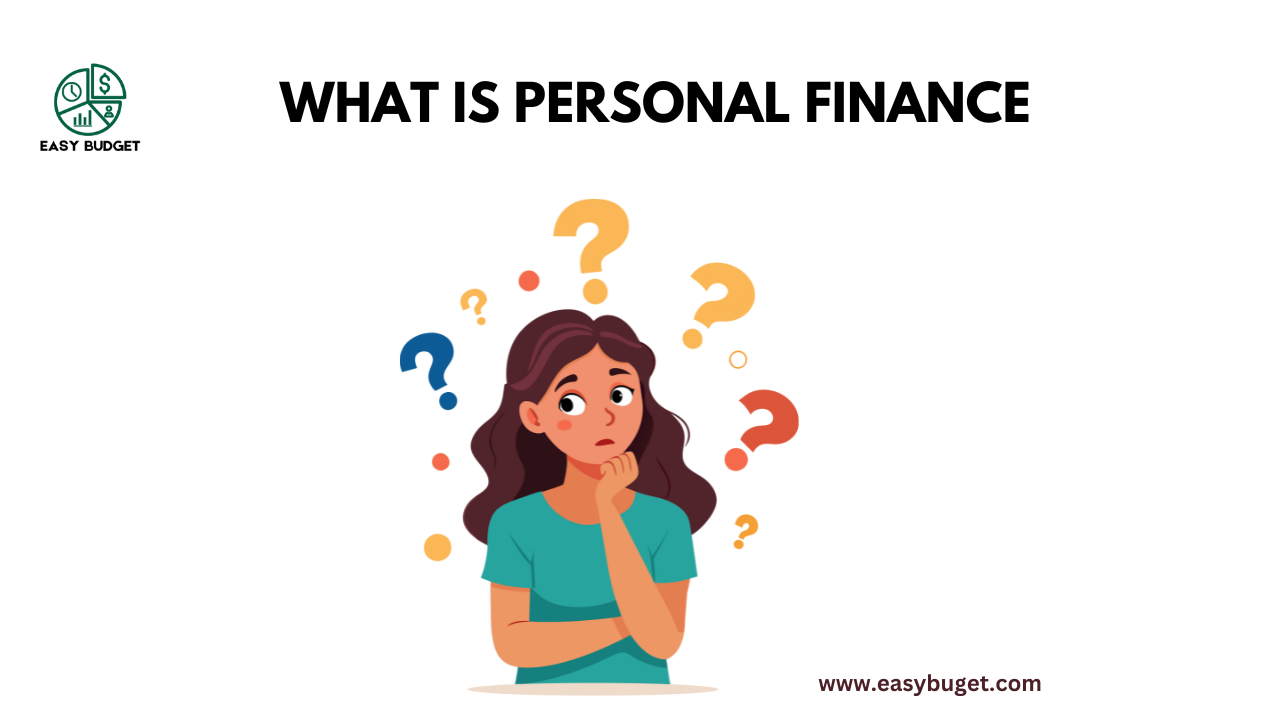Personal finance is way of managing your money without any stress. You can pay debt, save, invest and spent easily if you know the exact meaning of what is personal finance.
In this guide, We will break down everything you need to know about what is personal finance, from the basics to actionable steps you can take today.
What is Personal Finance?
Personal finance is the way you manage your money to meet your financial goals and cover your everyday needs. It includes everything from budgeting, saving, and spending to managing debt, investing, and planning for retirement.
Good personal finance habits help you make smart decisions about how to use your income, control your expenses, and prepare for unexpected situations like medical bills or job loss.
It is not just about how much money you earn it is about how wisely you use it to create a stable and stress-free financial life.
Managing personal finance starts with creating a budget that tracks your income and expenses. From there, you can set goals like building an emergency fund, paying off credit cards, or saving for a home.
It also includes learning how to use financial tools like checking accounts, credit cards, and investment accounts. By understanding the basics of personal finance, you gain control over your financial future.
This helps you avoid debt, build wealth over time, and make confident choices about spending, saving, and investing.
The 5 Key Components of Personal Finance
Here are the 5 key components of personal finance you need to focus on:
1. Budgeting
Budgeting is the foundation of personal finance. It’s about creating a plan for how you will spend and save your money. A popular method is the 50/30/20 rule:
- 50% for needs (rent, utilities, groceries).
- 30% for wants (entertainment, dining out).
- 20% for savings and debt repayment.
2. Saving
Saving is all about setting aside money for emergencies, goals, or future needs. Whether it’s a rainy-day fund or a down payment for a house, saving ensures you’re prepared for whatever life throws your way.
3. Investing
Investing is how you grow your wealth over time. It’s about putting your money to work through stocks, bonds, real estate, or other assets. The earlier you start, the more you benefit from compound interest.
4. Debt Management
Debt can be a major roadblock to financial freedom. Managing debt means paying off loans and credit cards while avoiding high-interest traps.
5. Retirement Planning
Retirement might seem far away, but planning for it now is crucial. Whether it’s through a 401(k) or an IRA, saving for retirement ensures you’ll have enough to live comfortably later in life.
For more tips on budgeting, check out NerdWallet’s budgeting guide.
What is the second foundation in Personal Finance
This second foundation of personal finance is important because debt can keep you stuck in a cycle where you are always playing catch-up. That means you are constantly paying debt.
To get out of debt, most financial experts recommend making a plan like the debt snowball or avalanche method and sticking to a budget.
Focus on paying off the smallest debts first or the ones with the highest interest rates. Once you are out of debt, you can start putting your money toward savings, investing, and other financial goals.
Getting out of debt builds discipline and lays the groundwork for the next steps in personal finance, like saving for emergencies or investing for your future.
Debt can slow down or even stop your financial growth. When you owe some money whether it is through credit cards, car loans, or student loans you are constantly paying interest.
That interest is money you could use to save, invest, or enjoy life. By getting out of debt, you free up your income and gain more control over your finances.
It is not just about paying what you owe it is about changing how you think and act with money. Living debt-free helps reduce stress and builds a strong base for financial freedom.
How to Take Control of Your Personal Finance
Ready to take control of your finances? Here’s how to get started:
1. Track Your Spending
The first step is understanding where your money goes. Use apps like Mint or YNAB to track your spending and identify areas where you can cut back.
2. Create a Budget
Once you know where your money is going, create a budget. The 50/30/20 rule is a great place to start, but feel free to adjust it to fit your needs.
3. Build an Emergency Fund
Life is full of surprises, and an emergency fund ensures you’re prepared. Aim to save 3-6 months’ worth of living expenses.
4. Pay Off Debt
If you have debt, make a plan to pay it off. Consider strategies like the snowball method (paying off the smallest debts first) or the avalanche method (tackling high-interest debts first).
5. Start Investing
Investing is one of the best ways to grow your wealth. Start small with low-cost index funds or ETFs, and consider platforms like Vanguard or Fidelity.
5 Mistakes to Avoid in Personal Finance
Here are the five mistakes to avoid in personal finance:
- Living beyond your means – When you spend more than you earn, you will eventually run into money trouble. It is a quick way to build debt and stress.
- Not having an emergency fund – Life throws surprises. Without savings, even a small problem like car repairs or medical bills can mess up your entire budget.
- Ignoring retirement savings – The sooner you start saving for retirement, the more your money can grow thanks to compound interest. Don’t wait until it’s too late.
- Falling for get-rich-quick schemes – If something promises fast, easy money, it’s likely a scam. Stick to real, proven ways to build wealth.
- Not learning about money – Understanding how money works helps you make smarter choices. The more you learn, the more confident you’ll feel managing your finances.
Top Tools and Resources to know What is Personal Finance
Here are some tools and resources to help you get started:
- Budgeting Apps: Mint, YNAB, PocketGuard.
- Investment Platforms: Robinhood, Fidelity, Betterment.
- Educational Resources: Books like “Rich Dad Poor Dad“ or podcasts like “The Dave Ramsey Show.“
How to Master Personal Finance for Long-Term Wealth
Here is the procedure how you can set yourself up for long-term success:
Start early and use compound interest. When you invest early, your money earns interest, and then that interest earns even more interest. Over time, your savings can grow much faster, even if you’re only investing a little at a time.
Don’t put all your money in one place. Spread your investments across things like stocks, bonds, and real estate. This way, if one thing loses value, the others can help balance it out.
Think ahead and save for retirement. Put money into a 401(k) or IRA so you have a solid financial foundation when you stop working. The earlier you start, the easier it gets to build the future you want.
Frequently Asked Questions About Personal Finance
What is personal finance?
Personal finance is the process of managing your money, including saving, investing, and budgeting.
Why is personal finance important?
It helps you achieve financial goals, avoid debt, and secure your future.
How do I start managing my personal finance?
Begin by tracking your spending, creating a budget, and building an emergency fund.
What are the key components of personal finance?
Budgeting, saving, investing, debt management, and retirement planning.
What tools can help with personal finance?
Apps like Mint, YNAB, and investment platforms like Vanguard or Fidelity.

